

 |
|
|
#51 | ||
|
College Starter
Join Date: Nov 2000
Location: South Florida
|
The Sport
May 1858 Magnolia Base Ball Club Claims Exclusion 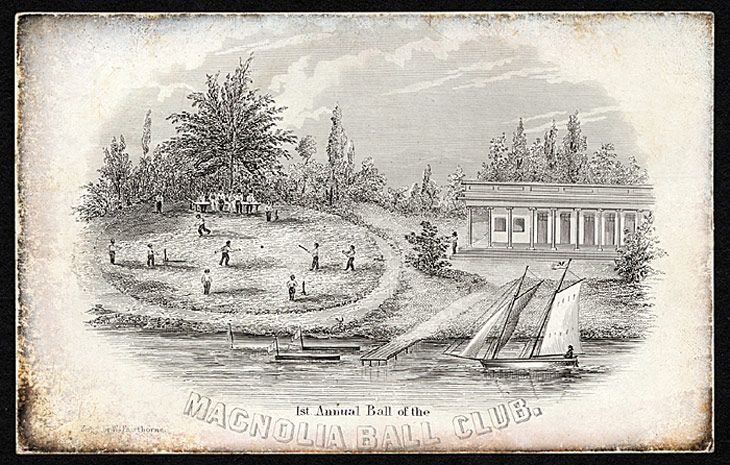 Advertisement for the End-of-Season First Annual Ball for the Magnolia Club (c. 1842) New York -- Among the organized groups that played baseball before the Knickerbockers were the New York, Brooklyn, Olympic, and Magnolia clubs. The last named is the only group still active. However, the Magnolias have never been invited to play other New York or Brooklyn clubs nor were they invited to the NABBP’s organizational meeting in March. Some members of the club claim they are excluded because their ball club is composed not of white-collar sorts and professionals with shorter workdays, but sporting-life characters, from ward heelers to billiard-room operators and bigamists. They venture to guess that the Magnolias are deemed too unseemly a bunch to associate with the clubs that like to present more gentlemanly airs to the public. The Magnolias were founded in the early 1840’s. The president of the group was 29-year-old, Irish-born John McKibbin Jr. He was a U.S. inspector—a patronage position perhaps obtained through the good offices of his father, who in an aldermanic stroke of fortune in 1835 had been named the city’s first Superintendent of Pavements. Seven years after calling the Magnolia Ball Club to muster and chowder, the younger McKibbin found himself a resident of Sing Sing, convicted of bigamy. The vice president and actual leader of the club, Joseph Carlisle, was the 26-year-old proprietor of the Magnolia Lunch and Saloon at 74 Chambers Street, corner of Broadway, offering “the best of Wines, Liquors, Segars, and every other requisite.” Why was this northern eatery named for a flower symbolic of the South? Perhaps to signal to the sporting crowd that this was a “full-service” house of the sort pleasing to Southerners in New York on business, and to the gamblers who left New Orleans after it banned gambling in 1835. The Magnolia Lunch advertised in New Orleans as well as in New York. In the rampant sporting culture of the day, Carlisle was an up-and-comer who went on to run, in addition to the Magnolia Lunch, the Fountain at 167 Walker Street near the Bowery, the Ivy Green in Hoboken, and an unnamed sporting house at 89 Centre Street opposite the Tombs, the city’s Egyptianate prison, where all the while he double-dipped as a jailer. The Magnolia Ball Club secretary, Andrew Lester, was a 27-year-old billiard-room proprietor and Tammany Democrat, linked with Isaiah Rynders’ Empire Club, the pugilistic arm of the party (which gave its name to the Empire Base Ball Club in 1854), enforcing discipline on the rank and file and striking fear into undecided voters. All three Magnolia officers had impeccable working-class, sporting, ruffian, and political associations of the sort that have been associated only with the unruly Brooklyn clubs of the mid-1850s, notably the Atlantics. Indeed, the Magnolia Ball Club was precisely the sort of poison for which the gentlemanly Knickerbocker Base Ball Club was created as an antidote…two years later. The club was one of the first to play matches at the Elysian Fields, these days a mecca among the New York and Brooklyn ball clubs. The Magnolias lament the fact that exclusion from the rest of the base ball world has taken a severe toll on the club. Membership has dwindled to the point where they can barely gather enough men to play an intra-squad match. Many left for other area base ball clubs. Others have left the game entirely. Those who remain fear the Magnolias soon will go the way of the New York, Brooklyn and Olympic clubs and become an extinct relic of base ball as it was before the Knickerbockers. Philadelphia Cricket Club Downs Delphian Cricketers 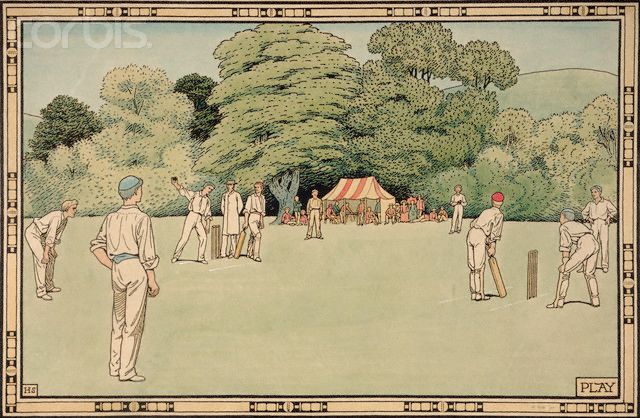 Philadelphia -- The Philadelphia Cricket Club opened match play with a 6 wicket victory over a collection of area cricketers that styled themselves as the 'Delphians.' The match was played on the cricket grounds near Bunker Hill. During the first innings, Delphian received good production from the middle of its order. Vernou and Sheldon led the way, scoring 21 and 31 respectively. Delphian finished the innings with 120 for 10, all out in 47.1 overs. The Philadelphians got off to a slow start. Both William Wister and Thomas Hall were dismissed with no runs in just 12 balls. Walter Newhall was the first to make hay for Philadelphia, scoring 31 in his 96-ball stay. He was dismissed after being caught by Charles Bane. David Jarvis added 22 and Philadelphia finished the first innings with 110 for 10, all out in 57.1 overs. Charles Vernou bowled well for Delphian, yielding 34 runs in 22 overs. He also tallied 13 maidens and took five wickets. At the close of the day, the Delphians led Philadelphia CC by 10 runs. Unfortunately, the Delphian batsmen came out flat on the second day. Only Charles H. T. Collis showed any fight, scoring 30. The Delphian side made 90 for 10 all out. Chasing 100, William Wister and Thomas Hall made up for poor showings in the Philadelphians' first innings by partnering for 76. Hall finished the second innings with a half century (56 runs), not out. Code:
Actual Result: Philadelphia CC won match by 1 Wicket British Cricket News Cambridge, UK, 23 April -- In a trial match of cricket at FP Fenner's Ground at Cambridge, the Cambridge University first squad lost to its second team (Cambridge University Next XXII) by an innings and 78 runs. Charles Cook led off the innings for Cambridge with a very respectable 83 before being holed out by Hornby. The partnership between Cook and Edward Horne was productive, generating 101 runs. After Horne was bowled by Charles Brereton, the other Cambridge batsmen only were able to add 48 before the end of the innings with a total of 149 all out. Brereton was in good form for the second squad and served up ducks to GS Gruggen and Henry Arkwright in consecutive deliveries. Charles Royds and Dillingham Seppings partnered for 63 and the Next XXII tallied 290 all out in their side of the innings. Brereton continued his dominant bowling the next day in Cambridge's side of the second innings. He took seven wickets in 25 overs and Cambridge was held to 63 runs all out. Horse Racing Results 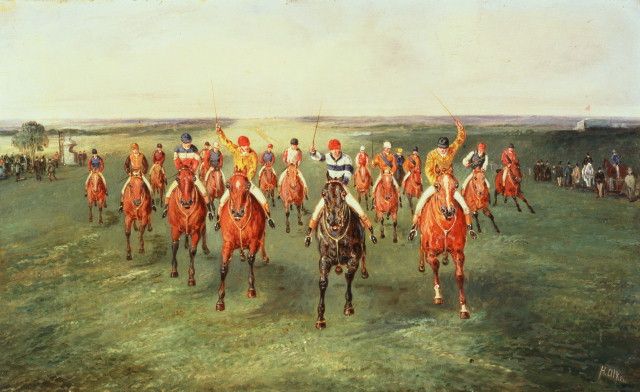 The finish of the Two Thousand Guineas at Newmarket Grand National (at Aintree Racecourse in Liverpool) Handicap steeplechase. Surface: Turf. Distance over 4 miles (3-1/2 furlongs) 1858 Winner -- Little Charley ridden by William Archer; owned by Christopher Capel 2,000 Guneas Stakes (at the Rowley Mile at Newmarket) Open to three-year-old thoroughbred colts and fillies. Surface: Turf. Distance: 1 mile 1858 Winner -- Fitz-Roland ridden by John Wells; owned by Sir Joseph Hawley 1,000 Guineas Stakes (at the Rowley Mile at Newmarket)Open to three-year-old thoroughbred colts and fillies. Surface: Turf. Distance: 1 mile 1858 Winner[/b] -- Governess ridden by Tom Ashmall; owned by William Gratwicke Upcoming Races: June: The Derby at Epsom Downs in Surrey. Open to three-year-old thoroughbred colts and fillies. Surface: Turf. Distance: one mile, four furlongs and ten yards. The Oaks Stakes at Epsom Downs in Surrey. Open to three-year-old thoroughbred colts and fillies. Surface: Turf. Distance: one mile, four furlongs and ten yards. September: The St. Leger Stakes at Doncaster. Open to three-year-old thoroughbred colts and fillies. Surface: Turf. Distance: one mile, six furlongs and 132 yards. Last edited by SFL Cat : 07-02-2014 at 08:41 PM. |
||
|
|

|
|
|
#52 |
|
Pro Starter
Join Date: Jan 2011
Location: Madison, WI
|
This is amazing stuff.
|
|
|

|
|
|
#53 |
|
College Starter
Join Date: Nov 2000
Location: South Florida
|
The Republic
June 1858 National News More Violence in 'Bleeding' Kansas 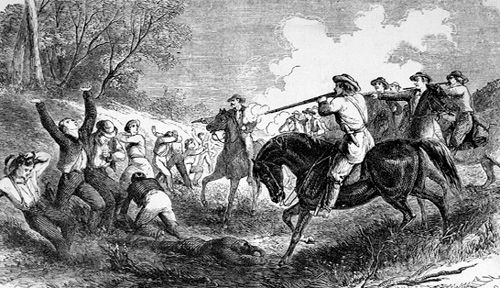 Pro-Slavery Ruffians Murder Free-Staters in Latest Bleeding Kansas Violence After months of relative calm in Kansas territory, some of the worst violence to date erupted between pro- and anti-slavery factions, leaving five dead, and five seriously wounded. On 19 May, a small band of about 30 pro-slavers stopped at the village of Trading Post, in Linn County. Eleven abolitionists and free-staters were captured in their fields or taken from their homes and marched into a ravine approximately 4 miles northeast of Trading Post and shot. Five of the prisoners were killed, five were seriously wounded and one was unharmed. None of the men captured were armed or, it is said, had participated in the ongoing violence. The names of the killed were: William Stilwell of Sugar Mound, recently from the state of Indiana. He was a young man, not over 28 and had a young wife and 2 small children. When he left home the morning of the massacre, his wife, with a presentiment of evil on her mind, urged him to take the Territorial road to Kansas City via of Osawattomie (sic). He assured her that there was no danger in taking the most direct road -- that he was known as (a) peace(ful) man and would not be molested. He was killed with a double-barreled shot-gun, loaded with pistol balls, the charge entering his left breast. Patrick Ross was an Irishman, who had been driven from his claim on the Little Osage, by a band of border ruffians. Mr. Colpetzer, a farmer from Pennsylvania. He was a quiet, peaceable man -- a fair type of that class of sturdy settlers who, snugly nestled among the green hills and valleys of the land of Penn, have by generations of thrift and industry, made her character for sobriety and good will proverbial to the world. He left a wife and family. Michael Robinson was a farmer from Iowa. He was a good citizen and universally respected. John F. Campbell, the storekeeper, was from Pennsylvania. He was of a remarkably social disposition and had endeared himself to all who knew him. He was quite young and had never been married. The wounded were Wm. Hairgorve, Asa Hairgrove, Charles Reed, Amos Hall and Charles Snyder. Wm. Hairgrove and Asa Hairgrove are brothers, originally from Georgia, who came to Kansas to live in a Free State. The Rev. Charles Reed is a Baptist clergyman from Wisconsin, who moved into the neighborhood of the Post the week previous to the tragedy. He denounced the course of the border-ruffians in public which had earned their hatred. Amos Hall was a settler and Charles Snyder, the blacksmith, was shot in the leg and back. The dead were brought to the village (of Trading Post) and placed in one of the houses. Some of the seriously wounded were there also; among them "Preacher Reed", as he was familiarly termed, who had crawled off into the woods after he was shot and was not found until the morning following, when he was discovered by his wife, who had searched for him all night and who had him conveyed to the town, where his wounds, which were dangerous, could be tended to and dressed. The survivors identified the leader of the raiding band as Charles Hamilton, who was known to them because he had been a resident of Linn County. Hamilton was originally from Georgia, owned slaves and had been forced off his land in Linn County and driven to Missouri by abolitionists. After the massacre, it is believed that Hamilton and his men returned to Missouri. The outbreak of new violence was a blow to efforts by federal troops at Fort Scott under command of Captain Nathaniel Lyon to restore law and order to the territory. Since 1855, there have been 59 deaths attributed to violence between pro-slavers and abolitionists. Minnesota Celebrates Statehood 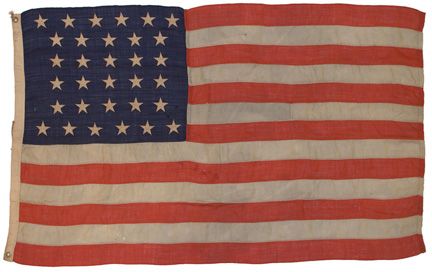 Minnesota entered the Union as the 32nd state on 11 May . Known as the "Land of 10,000 Lakes," Minnesota is the northern terminus of theMississippi River's traffic and the westernmost point of the inland waterway that extends through the Great Lakes and the St. Lawrence Seaway to the Atlantic Ocean. White settlement of the area began in 1820 with the establishment of Fort Snelling. In 1849, Minnesota became a U.S. territory. The building of railroads and canals brought a land boom during the 1850s, and Minnesota's population swelled from only 6,000 in 1850 to more than 150,000 by 1857. Former Missouri Senator Dies 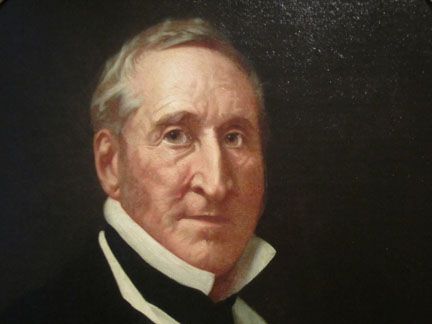 Washington DC – Former Missouri Senator Thomas Hart Benton, nicknamed Old Bullion died in April. Thomas Hart Benton was originally from North Carolina, but became a Senator in Missouri after being kicked out of the University of North Carolina and after serving in the Tennessee state militia under Andrew Jackson. Benton earned the name Old Bullion for his hard money views and ferociousness in debate. Benton was an unflagging advocate for gold coin (specie) or bullion as money—as opposed to paper money backed by gold. "Soft" currency, in his opinion, favored rich urban Easterners at the expense of the small farmers and tradespeople of the West. Benton was a legendary duelist and he was involved in many duels, including a pair involving attorney and Missouri legislator Charles Lucas. In 1817, the two had accused each other of lying when on opposite sides of a court case and later in the year, they had a dispute during an election about Benton’s eligibility to vote. Benton called Lucas an “insolent puppy” and Lucas demanded satisfaction. During the first duel at 30 paces, Lucas was shot through the throat, but survived. Benton was shot just below the knee. During the second duel, at nine paces, Lucas died less than an hour after being shot close to the heart. Benton was uninjured. Benton also was involved in a legendary brawl with Andrew Jackson. The fight between Jackson and Benton started while Jackson was general of the Tennessee militia and Benton was his aide-de-camp. There was a quarrel between Jackson’s friend and Benton’s brother, which resulted in a duel in which both men took bullets but survived. Jackson was present at the duel and a mediator. Benton accused Jackson of conducting the affair of honor unfairly and Jackson decided that Benton and his brother, “both deserved a thrashing.” Jackson ran into Benton and his brother outside a hotel and a brawl ensued. Jackson was hit by two bullets, one in the left arm and one in the left shoulder, which ruptured an artery. Several Jackson friends and relatives entered the brouhaha and pulled Jackson out of a pool of blood. Benton received several knife wounds, but escaped significant injury because he fell down a flight of stairs early in the fight. The fight was a political embarrassment for Jackson, who was a much older man than Benton, after he nearly died from his wounds. However, despite the deadly struggle between them and the bad feelings, Jackson and Benton would reconcile and become strong allies when Jackson became president of the United States. Benton was “Jackson’s voice” in the Senate and was critical to Jackson’s victory in his war against the Second Bank of the United States. Years after the fight Benton was asked if he knew Andrew Jackson and he replied, “Yes, sir, I knew him, sir; General Jackson was a very great man, sir. I shot him, sir. Afterward he was of great use to me, sir, in my battle with the United States Bank.” International News Rose Makes Gains For British In Central India Campaign 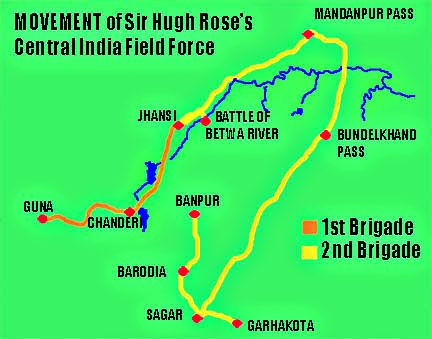 Sir Hugh Rose, who assumed the command of the Central India Field Force on 17 December 1857, has made impressive British gains in Cenral India. In January, the Raja of Banpur was defeated by Rose’s 2nd Brigade in a Skirmish type battle. At Barodia the Raja of Banpur again and Anant Singh were defeated in a battle whose intensity and magnitude may be gauged from the fact that the 2nd Brigade only suffered casualties of 2 men killed and 21 wounded. Sagar was relieved by the 2nd Brigade with whom Rose was marching on 3rd February. The relief of Sagar made communication and cooperation with the 1st Brigade possible because of the direct road link between Sagar and Guna, where the advance guard of the 1st Brigade was located. From Sagar, Hugh Rose and his 2nd Brigade advanced to Garhakota which was captured after a brief siege on 12 February. Again British casualties were light with none killed and four wounded. After Garhakota, Rose went back to Sagar for rest and resupply. Rose resumed his advance on 27 February and took the passes leading into Bundelkhand by resorting to feint attacks that misled the various local rulers about his direction of attack. Again these were insignificant operations since the fighting was nominal. At the battle of Madanpur Pass fought on 3 March, Rose suffered casualties of none killed and 12 wounded. Chanderi was besieged and captured by the 1st Brigade on 17 March with a loss of just 3 killed and 23 wounded. Meanwhile Rose ordered the 1st Brigade to join him for the siege of Jhansi. The 1st Brigade marched from Chanderi towards Jhansi and joined the 2nd Brigade on 25th March at Jhansi. British forces found Jahnsi well-defended and the fort had heavy guns which could fire over the town and nearby countryside. Rose demanded the surrender of the city; if this was refused it would be destroyed. After due deliberation the Rani Lakshmibai of Jhansi issued a proclamation: "We fight for independence. In the words of Lord Krishna, we will if we are victorious, enjoy the fruits of victory, if defeated and killed on the field of battle, we shall surely earn eternal glory and salvation." She defended Jhansi against British troops when the siege began on 23 March 1858. The British bombardment was met by heavy return fire. 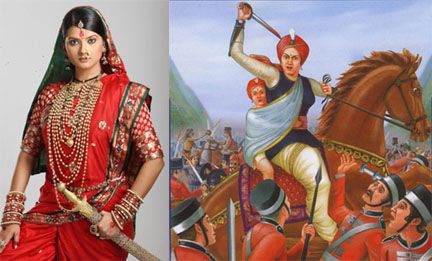 The Rani Lakshmibai The defenders sent appeals for help to rebel leader Tatya Tope. His army of more than 20,000 tried to relieve Jhansi but was defeated by Rose on 31 March near the Betwa River. During the battle with Tatya Tope's forces, part of the British forces continued the siege and by 2 April it was decided to launch an assault by a breach in the walls. Four columns assaulted the defenses at different points and those attempting to scale the walls came under heavy fire. Two other columns had already entered the city and were approaching the palace together. Determined resistance was encountered in every street and in every room of the palace. Street fighting continued into the following day. The Rani withdrew from the palace to the fort and after taking counsel decided that since resistance in the city was useless she must leave. With her son Damodar Rao on her back she jumped on her horse Badal from the fort and escaped. It is believed that the Rani Lakshmibai has joined Tatya Tope in Kalpi. |
|
|

|
|
|
#54 |
|
College Starter
Join Date: Nov 2000
Location: South Florida
|
The Sport
June 1858 'Old Smoke’ Morrissey to Meet John Heenan in Fall Bout 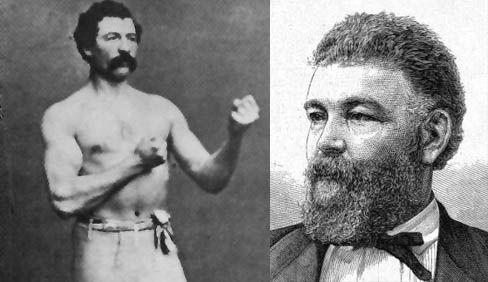 John C. Heenan (l) and John ‘Old Smoke’ Morrissey (r) New York -- John ‘Old Smoke’ Morrissey has agreed to fight John Heenan this fall for the championship of America. Morrissey is the reigning champion of America. He won his title in controversial fashion from “Yankee” Sullivan in 1853. Sullivan knocked out Morrissey and left the ring, thinking he’d won. However, Morrissey’s firsts were able to rouse him and get him back to scratch. With Sullivan gone, Morrissey was declared the winner. Morrissey’s last fight was in 1854 against William “Bill the Butcher” Poole. There was a history of bad blood between Morrissey, an Irishman and Tammany Hall Democrat, and Poole, an enforcer for the Know-Nothing Party and a leader of the Bowery Boys. It began after the Sullivan fight when Poole, who had heavily wagered on Sullivan, disputed the result of the bout and insisted wagers shouldn’t be honored. Poole beat Morrissey badly. According to the New York Daily Times, Morrissey “presented a shocking spectacle, and scarcely could any of his friends recognize him. His eyes were closed and one of them was found to be gouged from one end of the socket, which injury will probably impair his sight for life. There were large bunches on all parts of his head. His face above and below the eyes is blackened by violent blows given on the bridge of his nose. There is a hole in his cheek, and his lips are chewed up in a frightful manner. He also sustained fearful injuries about his breast, arms, and back, where Poole kicked him with heavy cowhide boots after he helloed enough. So severe are Morrissey's injuries, that it is very doubtful whether he walks in the street for the next six months.” Several months later, Lew Baker, a former NYPD officer and close friend of Morrissey, sought vengeance. He and two companions entered Stanwix Hall, a bar on Broadway that is a center of the city’s night life, where he confronted and shot Poole. Poole died two weeks later. Morrissey and Baker were indicted for murder, but the charges were dropped after three trials resulted in hung juries. New York-born Heenan, known as ‘the Benicia Boy’, made a name for himself as a brawler in the California gold fields. Heenan’s manager and trainer, Englishman Jim Cusick, has been actively pursuing a title fight with Morrissey.  Sayers to Meet Paddock in June Bout The long anticipated bout between Tom Sayers and Tom Paddock for the championship of England will take place at some point in June. The location of the fight is being kept close to the vest by organizers to prevent the police from disrupting the event. Although prizefighting in England is supported by members of the establishment from royal princes downwards, it is considered illegal under the terms of the Riot Act of 1715. Fights are typically held in warehouses, courtyards of inns, or in open fields away from the eyes of local authorities. Philadelphia Defeats Young America 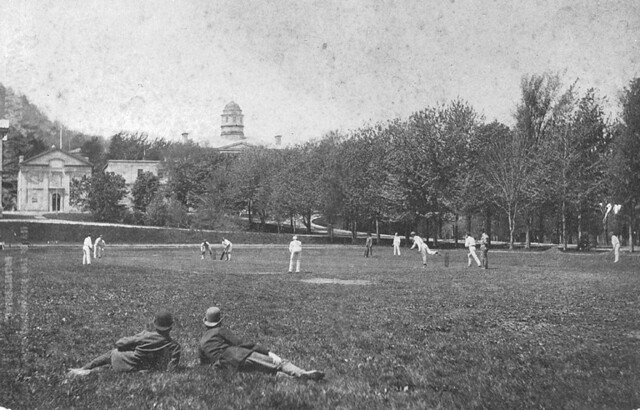 Camden, NJ – At the Cricket Grounds in Camden, the Philadelphia Cricket Club (106 and 104) downed Young America (59 and 67) by 84 runs. On the first day, Widdis and Newhall bowled masterfully for the Young Americans in the early going, retiring Howe, Wister and Johnson. Tom Facon finally showed some punch for the Philadelphians, collecting 16 runs. Later in the innings Barclay added 22 before being run out. Only Newhall showed any game at bat for the Young Americans, scoring 14 runs. On the second day it was J.B. England who led the way for the Philadelphia batsmen with 23 runs. For Young America, Fisher produced a plucky 12 and was not out, but his mates showed little fight. W.S. Newhall was the only other Young American to score double digit runs, with 10. Code:
May Cricket Match Results in England Cambridge University Defeats Gentlemen of Cambridgeshire by 6 Wickets 06 May, FP Fenner's Ground, Cambridge -- The Cambridge University men (149 and 89/4) defeated the Gentlemen of Cambridgeshire (117 and 113) by 6 wickets. Only the Gentlemen's Frederick Bell showed any pluck with the bat during the first innings, producing 69 runs of Cambridgeshire's 117 and was not out. G.E. Cotterill and F.H. Norman were the top batsmen for Cambridge, scoring 38 and 29 for Cambridge. The University men tallied 149 in their first innings. Bell led the way again in Cambridgeshire's second innings, scoring 57, not out, and the Gentleman finished the second innings with 113. Chasing 88, the University men saw good production from Bayford (20), Royds (22) and Cotterill (19), winning the match midway through the order. Cambridge University routs Cambridge Town Club 13, 14 May, FP Fenner's Ground, Cambridge -- F.H. Norman and W.H. Benthall both had centuries as the University men tallied 312, all out, in their first innings. Cambridge Town Club batted first and scored 151, all out, in their side of the innings, which was less than half of the University men's total. The Cambridge Town Club conceded the match following the University men's first innings. All England Eleven Defeats Oxford University 17, 18, 19, 20 May, Magdalen Ground, Oxford -- In a four day affair, the All England Eleven (82 and 121) cricketers defeated Oxford University (77 and 103) by 23 runs. Other Match Results 01 May -- Peripatetics defeated Westminster by 103 runs at Vincent Square, Westminster (1-day match) 06 May -- Match drawn between Windsor Garrison and I Zingari at Windsor Calvary Barracks, Windsor (1-day match) 10 May -- Match drawn between Earl of Winterton's XI and FTA Hervey-Bathurst's XI at Lord's Cricket Ground, St. John's Wood (1-day match) 13 May -- Match drawn between Oxford and Oxfordshire at Magdalen Ground, Oxford (1-day match) 14 May -- Cheltenham College defeated Marlborough College by 6 wickets at College Ground, Cheltenham (2-day match) 15 May -- Match drawn between Maidenhead and Peripatetics at Maidenhead (1-day match) 17 May -- Ireland defeated Marylebone Cricket Club by an innings and 10 runs at Lord's Cricket Ground, St. John's Wood (2-day match) 22 May -- Match drawn between Eton College and I Zingari at Agar's Plough, Eton College (1 day match) 25 May -- Match drawn between Eton College and Windsor Garrison at Agar's Plough, Eton College (1 day match) 27 May -- Harrow School defeated Household Brigade by an innings and 46 runs at Harrow School Cricket Ground, Harrow-on-the-Hill (1-day match) 28 May -- Bradford defeated Broughton by an innings and 14 runs at Broughton Cricket Club Ground, Salford (2-day match) 29 May -- Match drawn between Bullingdon and I Zingari at Bullingdon Green, Oxford (1-day match) 31 May -- Match drawn between Earl of Winterton's XI and JG Boothby's XI at Lord's Cricket Ground, St. John's Wood (1-day match) Last edited by SFL Cat : 08-01-2014 at 04:14 PM. |
|
|

|
|
|
#55 | |
|
College Starter
Join Date: Nov 2000
Location: South Florida
|
The Republic
July 1858 National News Illinois Republican Senate Hopeful Delivers Speech on Threat of Divided Nation 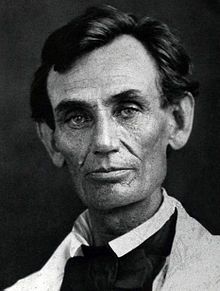 Illinois Republican candidate for U.S. Senate, Abraham Lincoln Springfield, IL -- At the Illinois state capitol, Abraham Lincoln, 49, accepted the nomination of the fledgling Republican party to run for the U.S. Senate against the Democrat incumbent, Stephen A. Douglas. Upon accepting the nomination, Lincoln delivered a speech about how the United States has become like a "House Divided," drawing on the biblical verse found in Mark 3:25. Quote:
Lincoln used the speech to differentiate himself from Douglas, who has long advocated popular sovereignty, under which settlers in U.S. territories decide their own status as slave or free state. Lincoln argued that the Dred Scott decision had closed the door on Douglas's preferred option and left the Union with only two remaining outcomes: the United States will either become all slave, or all free. The fact that the North and South have come to hold distinct opinions on the question of slavery, and that the issue permeates every other political question indicates a time is coming soon when the Union will no longer be able to function under the current divide. Lincoln was born in Hardin County, Kentucky. His family moved first to Indiana, and later to Illinois. As an adult, Lincoln settled in New Salem, Illinois in Sangamon County. Lincoln served as a captain in the Illinois Militia during the Black Hawk War. After the war, Lincoln ran for the Illinois General Assembly and finished eighth out of 13 candidates. Lincoln served as New Salem's postmaster and later as county surveyor. He then decided to become a lawyer and began teaching himself law by reading Blackstone's Commentaries on the Laws of England and other law books. In 1834, Lincoln ran a second campaign for the state legislature and won. Though he ran as a Whig, many Democrats favored him. He served four successive terms in the Illinois House of Representatives as a Whig representative from Sangamon County. In 1836, Lincoln was admitted to the bar. He moved to Springfield, Illinois and began to practice law under John T. Stuart. Lincoln became a successful lawyer with a reputation as a formidable adversary during cross-examination. In 1840, Lincoln was married to Stuart's cousin, Marry Todd. In 1844 he began his own law practice. In 1846, Lincoln was elected to the U.S. House of representatives, where he served one two-year term. He was the only Whig in the Illinois delegation, but he showed party loyalty by participating in almost all the votes and making speeches that echoed the party line. He partnered with abolitionist Congressman Joshua R. Giddings in writing a bill that abolished slavery in the District of Columbia. The bill compensated former owners, enforced fugitive slave laws and proposed a popular vote on the matter. Lincoln abandoned the bill when it failed to garner sufficient Whig support. Lincoln spoke out against the Mexican-American War, which he attributed to President Polk's desire for "military glory." He also supported the Wilmot Proviso, which, if adopted, would have banned slavery in U.S. territory won from Mexico. Following the split in the Whig party caused by the Kansas Act, Lincoln was instrumental in forging the shape of the new Republican Party, drawing on Whigs, disenchanted Free Soil, Liberty and Democrat party members. At the 1856 Republican National Convention, Lincoln placed second in the contest to become the party's candidate for vice president. Douglas remains popular. During his career, he has tried to steer a middle course on the slavery issue. His popular sovereignty doctrine has been satisfactory to Southerners who don't want outside interference with slavery and Northerners who don't want to take sides over it. It has been famously said of him that he doesn't care whether slavery is voted up or down, as long as it is voted on by the people. Despite this, Douglas has taken the side against President James Buchanan and his Southern allies to admit Kansas Territory as a slave state. It is said the two have become bitter enemies. Slavery has been a divisive issue between Northern and Southern Democrats and could eventually splinter the party. International News War in Mexico: Liberals Establish New Capital in Veracruz Ousted President Benito Juárez and his Liberal supporters have set up a new capital in Veracruz after being forced to flee from Mexico City during a coup led by army general Félix Zuloaga. Juárez and other liberals gained political control in Mexico following the loss of about half of Mexico's colonial territory to the United States in the Mexican-American War. Believing the Church and military were the source of most of Mexico's problems, the Liberals passed a series of Reform Laws that allowed the government to confiscate Church land and convert it to private property. The laws also prohibited corporate bodies from owning lands, which included communal land owned by Indian villages. Also, religious celebrations outside churches was forbidden as was the use of church bells and clerical dress in public. These laws met strong resistance from Conservatives, the Church and the military. General Tomás Mejía rebelled against the Liberal government in the defense of the Catholic identity of Mexico in the Sierra Gorda region of Querétaro. Opposition to the these laws culminated in a take over of Mexico City by Conservative forces. This operation was called the Plan of Tacubaya and was led by Zuloaga. The Plan of Tacubaya deeply divided the country, with each state deciding whether to support the Liberals' Reform Constitution or the Conservatives' takeover of Mexico City. Juárez who was imprisoned, escaped and fled to the city of Querétaro. Júarez was recognized as the Liberals' interim president. As Zuloaga and the army have taken more of the central part of Mexico, Juárez and his government was forced to retreat to the city of Veracruz. From there, the Liberal government has control over the state of Veracruz and a number of allied states in the north and central-west. Last edited by SFL Cat : 10-20-2014 at 07:57 PM. |
|
|
|

|
|
|
#56 |
|
n00b
Join Date: Sep 2018
|
Amir Khan is ready to be back in the ring against the Colombian boxer Samuel Vargas. The fight is to be on 8th September 2018 at Arena Birmingham and we see that Amir Khan is confident about his return. What they can do with complete ease is watch Amir Khan vs Samuel Vargas free online for an experience just as good.
“I hope to give the fans in Birmingham the same excitement and fireworks as my last fight. It will be one not to miss!” Khan says. However, this fight will be an unpredictable one yet the excitement tells that it will be the best to date! Last edited by mronaldhino77 : 09-06-2018 at 11:00 AM. |
|
|

|
|
|
#57 | |
|
n00b
Join Date: Nov 2018
|
Quote:
Yes, truly this time fight was awesome. I watched it here in Sydney on Sky Sports but I had to use a usa vpn to connect to it. When is the next fight of Amir and against home so I set my plan. |
|
|
|

|
|
|
#58 |
|
Dark Cloud
Join Date: Apr 2001
|
Cricket, whoa.
__________________
Current dynasty: OOTP25 Blitz: RTS meets Moneyball | OOTP Mod: GM Excel Competitive Balance Tax/Revenue Sharing Calc | FBCB Mods on Github |
|
|

|
|
|
#59 | |
|
n00b
Join Date: Jan 2020
Location: USA
|
Quote:
Indeed. It is quite easy for me to unblock the content. Though i got few issues while traveling to Vietnam but not much in any other countries. Even in China i can manage to get the access to my favorite sporting channels through vpn. With i would recommend to go with any speedy VPN there are many slow vpns exist and they really cause problem in such regions. Last edited by EvanLee : 01-03-2020 at 07:53 AM. |
|
|
|

|
|
|
#60 | |
|
n00b
Join Date: Apr 2020
|
Quote:
I was in China back then, had to arrange for a VPN beforehand because it isn't easy to get it once you arrive in China. China has stringent rules for the online content from foreign countries. Last edited by DavidBell8819 : 04-18-2020 at 03:23 PM. |
|
|
|

|
 |
| Currently Active Users Viewing This Thread: 1 (0 members and 1 guests) | |
| Thread Tools | |
|
|